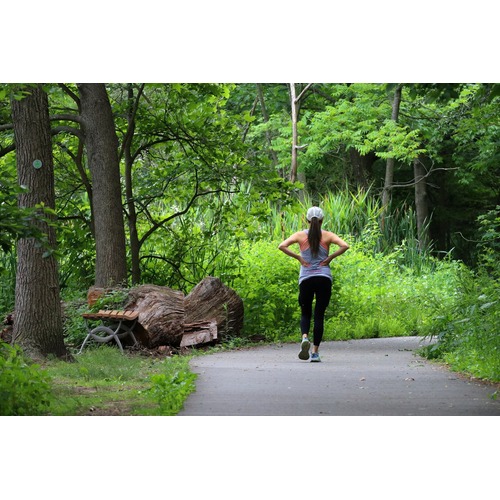Why Walking Is the Underrated Superpower of Self-Care

In a world obsessed with quick fixes and high-intensity routines, walking often gets overlooked. It’s so simple, so ordinary, that many of us forget it can be one of the most powerful tools for improving our mental and physical wellbeing.
Whether it’s a morning stroll through the park, a lunchtime walk to clear your head, or an evening wander to unwind, walking offers benefits that stretch far beyond basic fitness. It’s accessible, sustainable, and surprisingly transformative — the ultimate form of self-care hiding in plain sight.
The Simplicity of Walking: Why It Works
Walking doesn’t require fancy equipment, expensive gym memberships, or complicated routines. You can do it anywhere, anytime — and yet, its effects can rival those of more strenuous workouts.
Movement That Feels Effortless
Unlike intense exercise sessions that demand willpower, walking fits naturally into your day. It’s low-impact, meaning it’s easy on the joints and suitable for all ages and fitness levels. But that doesn’t make it any less effective — even a brisk 20-minute walk can boost circulation, strengthen your heart, and release endorphins.
A Habit That Builds Without Pressure
Because it’s so easy to start, walking often becomes a gateway habit. You begin with short, casual strolls, and before long you’re walking several miles without even thinking about it. It’s a sustainable routine — one that can evolve naturally without forcing you into drastic lifestyle changes.
The Science Behind the “Walk Effect”
Science has a lot to say about why walking is so beneficial for both mind and body. Research consistently shows that regular walking:
-
Improves cardiovascular health by lowering blood pressure and cholesterol.
-
Boosts mood by increasing serotonin and dopamine levels.
-
Enhances creativity and focus, especially during outdoor walks.
-
Supports longevity, with studies linking daily walking to lower risk of chronic disease.
In essence, every step you take contributes to better health — one stride at a time.
Walking and Mental Health: The Mind-Body Connection
Walking is not just about physical fitness; it’s a mental reset button. In an age where screens dominate our attention and stress is part of daily life, a simple walk can bring balance back.
Reducing Stress and Anxiety
Walking helps regulate cortisol, the body’s stress hormone. Even a short walk can ease tension in your muscles and calm racing thoughts. The rhythmic movement and breathing mimic meditation — you move your body while letting your mind slow down.
The Power of Walking Outdoors
Nature amplifies the benefits of walking. Spending time outside, even for 10–15 minutes, can lower anxiety, improve mood, and boost energy levels. It’s what psychologists call “attention restoration” — the process of recharging your mind simply by being in natural surroundings.
If you live in a city, head to a local park or riverside path. The combination of fresh air, greenery, and gentle motion works wonders for mental clarity.
Walking as a Form of Mindfulness
You don’t have to sit cross-legged or close your eyes to practise mindfulness. Walking itself can become a moving meditation.
Mindful Walking Practice
Next time you go for a walk, leave your phone behind and tune in to your surroundings. Notice the texture of the pavement, the rhythm of your footsteps, the feeling of your breath, and the sound of the wind.
This mindful attention brings you back to the present moment — away from to-do lists and notifications. With every step, you reconnect with yourself.
Walking for Gratitude
Walking is also a beautiful way to practise gratitude. Think of three things you’re thankful for during your walk. It could be as simple as the warmth of the sun or the ability to move freely. Gratitude reframes your mindset, helping you view your day through a more positive lens.
How Walking Boosts Creativity and Focus
There’s a reason many great thinkers were walkers. Charles Dickens, Virginia Woolf, and Steve Jobs all used walking as a way to think, reflect, and spark ideas.
The Creative Flow
Walking increases blood flow to the brain, encouraging divergent thinking — the kind that helps generate new ideas. When you walk, your mind relaxes, creating space for creative connections to form naturally.
If you’re stuck on a work problem or a creative block, take a 15-minute walk. You’ll likely return with a fresh perspective or even a complete solution.
Turning Walking into a Self-Care Ritual
The beauty of walking lies in how easily it can become part of your self-care routine. Here’s how to elevate it from a daily activity to a wellness ritual.
Set a Gentle Intention
Before stepping out, set a simple goal for your walk. It could be “to clear my mind”, “to breathe deeply”, or “to reconnect with nature”. This intention shapes your walk into something more meaningful than just exercise.
Create a Walking Playlist or Podcast Routine
Music can transform your mood instantly. Curate playlists that match your energy — upbeat tunes for motivation or soothing sounds for relaxation. Alternatively, listen to a podcast or audiobook to make your walks both entertaining and educational.
Choose Your Time and Place
Morning walks are perfect for energising your day, while evening walks help you unwind. Experiment to find what works best for your lifestyle. The key is consistency — even 20 minutes daily makes a difference.
Walking and Connection: The Social Side of Self-Care
Self-care isn’t always a solo journey. Walking is also a fantastic way to connect with others.
-
Walking with friends or family encourages bonding without distractions.
-
Join a local walking group or charity walk to meet like-minded people.
-
Walk and talk meetings are a refreshing alternative to sitting in front of screens all day.
Social walking blends movement, conversation, and companionship — three essential ingredients for wellbeing.
Small Steps, Big Changes
The most remarkable thing about walking is how small actions create long-term impact. A few thousand steps a day might not feel like much, but over time, they add up to stronger health, a calmer mind, and a lighter spirit.
You don’t need to track every stride or chase a step count. Simply focus on being present and consistent. Every walk — no matter how short — counts towards your wellbeing.
Walking Is the Ultimate Self-Care Secret
In a world that often glorifies busyness, walking invites us to slow down. It reminds us that caring for ourselves doesn’t always mean doing more — sometimes, it’s about doing less and simply being in motion.
Whether you’re wandering through city streets, strolling along a beach, or pacing your neighbourhood at sunset, walking has the quiet power to heal, ground, and inspire.
So, the next time you feel overwhelmed, take a walk. Breathe deeply. Notice the world around you. You might just discover that the simplest act of all — putting one foot in front of the other — is your most powerful form of self-care.
Explore TBTD Today!
Grab the Best Flight Deals Now
Grab the Best Car Rental Deals Now
Grab the Best Bus Ticket Deals Now
Grab the Best Airport Transfer Deals Now
Grab the Best Adventure Tour Deals Now
Grab the Best Train Ticket Deals Now
Grab the Best Cruise Ticket Deals Now
Explore AP Today!

 Luxury
Luxury
